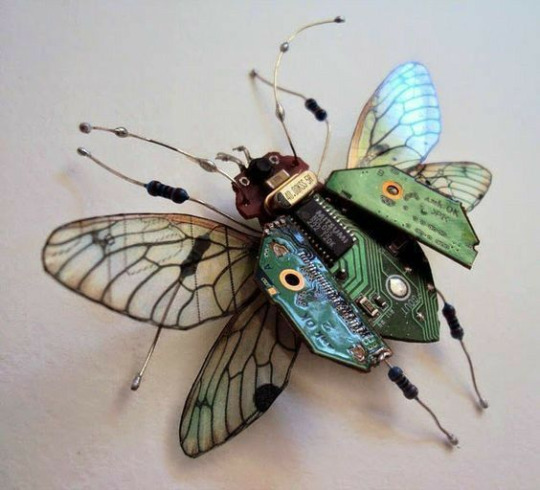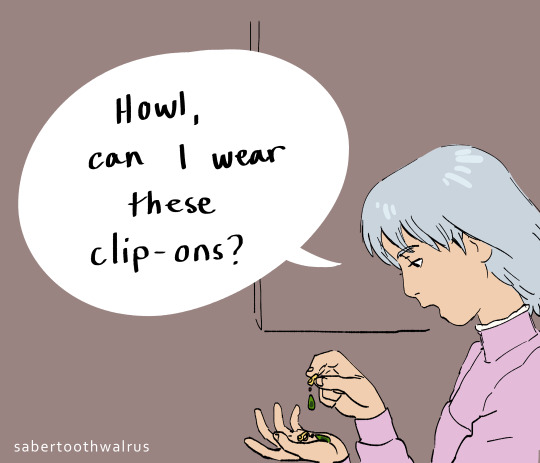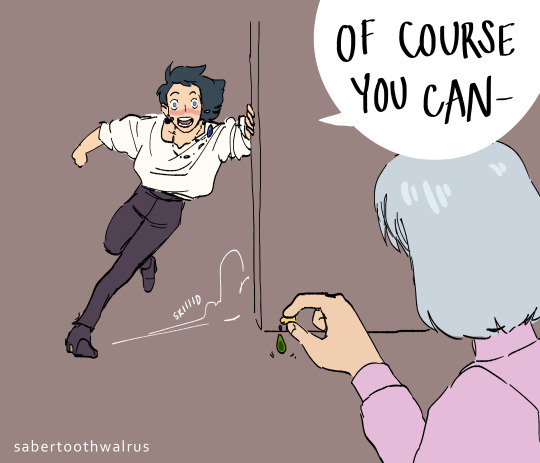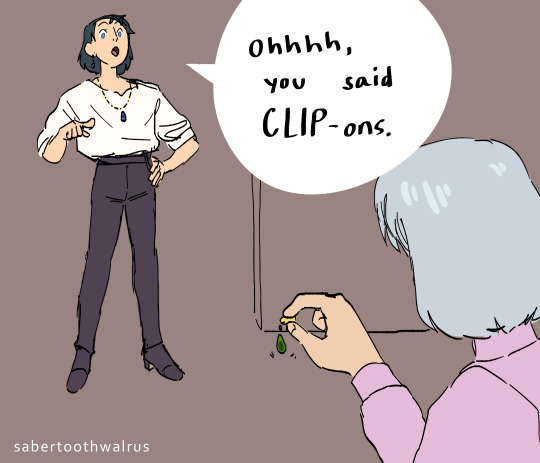• Freddie • They/She tme • 25 • Butch Lesbian• @ahwuum is my minecraft wife •🇮🇪• Ko-fi link is https://ko-fi.com/freddieb if u wanna support a starving artist
Don't wanna be here? Send us removal request.
Text
Just looked up poliotics. ... HUGE mistake . who did all that?
16K notes
·
View notes
Text
sending my kid to montresori school where they learn to seal eachother up in the wall
11K notes
·
View notes
Text
Sent a 12 year old on a fake Hero’s Journey last week and holy shit he actually did it
68K notes
·
View notes
Text
The Matriarch Isn’t the Villain. She’s the Mirror

I often hear a discourse where Celine in K-pop Demon Hunters, Alma in Encanto and Ming in Turning Red are seen as vilains. They’re the ones who restricted the younger generation, hurt them, and are ultimately responsible for their pain, trauma and self-doubt. They’re framed as the real villains of the story. But I’d like to differ.
These are stories of intergenerational trauma. They are women who survived, repressed, and tried to protect their families the only way they knew how: through control, perfectionism, and emotional suppression.

And yet, when the next generation begins to reclaim joy, freedom, softness — they become the obstacle. Not because they’re bad people, but because they’re scarred. Their minds cling to survival strategies, unable to recognize that the environment has changed.
Alma is still stuck fleeing the colonizers.
Ming is still afraid of her true self.
Celine believes that fear and mistakes must be hidden.
It’s not about hating these characters. It’s about how unprocessed trauma twists love into control. How survival, unexamined, turns into rigidity. These women were never given space to process their own pain and they project it onto their daughters and granddaughters.

And here’s something we rarely say enough: intergenerational trauma can create toxic patterns but that doesn’t always mean there was abuse or conscious harm. Even when their love becomes suffocating or controlling, these women are not necessarily “abusive parents.” They are daughters of silence, fear, and sacrifice. And they were never taught another way. It’s important to make that distinction, especially in a world that often pushes a binary, punitive reading of family dynamics.
They’re the product of a generation that was told to endure. But endurance without healing becomes its own kind of violence.

What’s powerful in these stories is that they don’t end in vengeance. They end in confrontation and transformation. The confrontation is necessary: the younger generation refuses the silence. Refuses the shame. Refuses to carry a burden that wasn’t theirs to begin with.
The house is destroyed in Encanto.
Mei accepts her full self.
So does Rumi.
And in the best cases, this confrontation allows the elder to soften too. Alma opens up. Ming listens. And I’m hoping in the sequel, Celine will open too.

Maybe that’s also why these stories speak so deeply to POC audiences. These aren’t stories about cutting ties. They’re stories about how hard it is to transform them, to protect ancestral bonds while refusing to perpetuate inherited pain. In many racialized families, collectivity, loyalty, and intergenerational duty are sacred... even when they come at the cost of personal boundaries.
And sometimes, Western individualist frameworks read these tensions as dysfunction or villainy. But for us, they’re just the difficult truth of growing up and trying to do better.
These women aren’t villains. That would be too easy. They embody the fragile, necessary work of bringing change without breaking the thread. These stories are about refusing to inherit their pain without reflection. Because love, without accountability, is not enough.
These stories show us that each generation has something to learn from the next. And the new generation must also break free from the chains they inherited while preserving what is meaningfull.

But it’s not just their story.
One day, we’ll be the older generation.
And we’ll need to be humble enough to learn from the ones after us.
So don’t be a fool.
We may be Mei, Rumi, or Mirabel today.
But tomorrow, we could be Ming, Celine, or Alma.
And when that time comes, we’ll realize how hard it is to unlearn what once kept us safe.
So let’s have compassion for all these characters.
Because these stories show us not just how the cycle of generations works, but how it can make us better, stronger, and more connected... if we’re all willing to go through the change.
∘₊✧──────✧──────✧₊∘
If you’re curious, I’ve written more on K-pop Demon Hunters:
A post on the mental health themes woven through the songs — right here.
A breakdown of Celine-Rumi in comparaison to Gothel–Rapunzel dynamic — here.
An analysis about Rumi, Jinu, and the danger of sinking together — here.
Some book recs for each of the K-pop Demon Hunters characters — here.
3K notes
·
View notes
Text
my new thing whenever an embarrassing memory jumps up out of some backwater neuron to t-bone my present-day thought process is to declare a statute of limitations. like i can burn down an entire building in the state where i live and the law deems it both unfair and illegal to prosecute me after six years have passed, i think that thing i said in high school can be expunged from my record.
59K notes
·
View notes
Text
I just found someone sharing this on twitter, so sorry that I don't have the link but omg

160K notes
·
View notes
Text
you’re 23 and you learn rosemary kennedy was lobotomized at 23 and you’re like my god she was barely an adult. then you’re 27 and you’re like holy hell amy winehouse was just starting her life. and then, presumably, you reach 36 and you’re like christ alive marilyn monroe was only 36. and so on and so forth
2K notes
·
View notes
Text
No, tumblr user, I don’t think the hatred of trans women is cemented on the hatred of men. I believe, god forbid, it might be based on the hatred of women.
3K notes
·
View notes
Text
I woke up to the news of the martyrdom of a relative of mine and his five children. Their remains were collected after being torn apart by a missile.
2K notes
·
View notes
Text
*Valley Girl voice*: I must, like, not fear. Fear is literally the mind-killer. Like it’s basically the little-death that brings total obliteration. I will totally face my fear. I will permit it to pass over me and through me, and? When it’s gone? I’m gonna like turn the inner eye to see its path! Where the fear has gone there will be literally nothing. Only I will remain.
2K notes
·
View notes
Text










THE LORD OF THE RINGS (1978) dir. Ralph Bakshi THE LORD OF THE RINGS (2001 - 2003) dir. Peter Jackson

3K notes
·
View notes
Text
the moment i first understood the myth of meritocracy i think was when i read the "Eragon" books as a teenager, and it said on the back that the author had started writing them at 15 and it became a bestseller. this stressed me out so much, I also wanted that kind of success in writing at such a young age & kept thinking I should also be able to do it, that I must be doing something wrong – and then YEARS later i found out his parents had a publishing company and financed him touring through the whole U.S before the books became successful
15K notes
·
View notes
Text

today's bug thing is this beetle made out of circuit boards!
5K notes
·
View notes
Text

my old partner came back but something feels wrong…
⚠️cw: minor horror
Heavily based on Jack Stauber’s “Library”












257 notes
·
View notes



